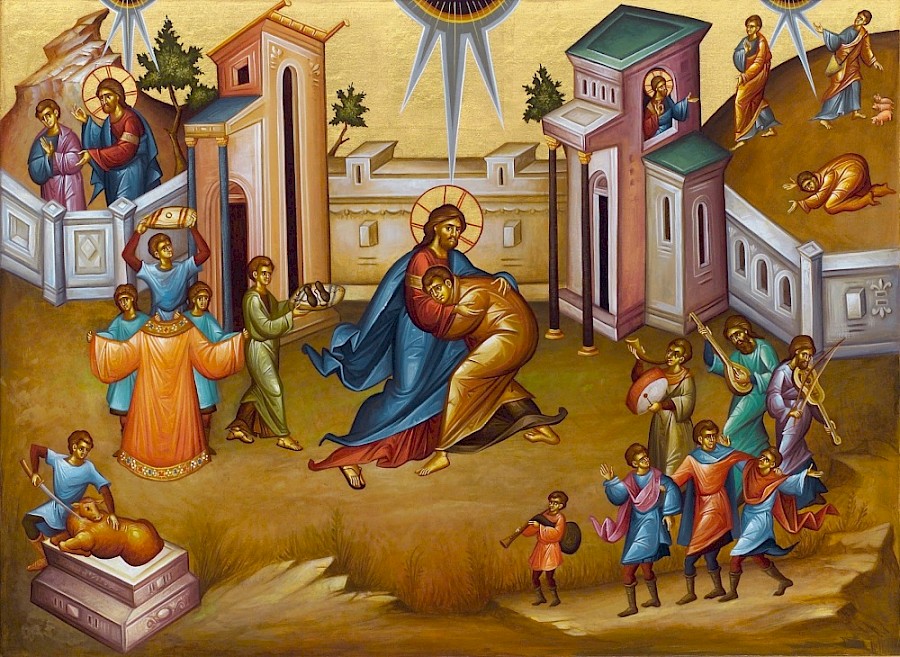Synaxarion of the The Sunday of the Prodigal Son.

Today, the Sunday of the Prodigal Son, we call to remembrance the noble parable that is in the Holy Gospel according to the Apostle Luke.
There are people, as they live prodigally from their youth, who observe in themselves many improper things. Spending their time in drunkenness and wantonness, they have fallen into a depth of wickedness and reached despair, which is a result of pride. Yet they do not wish to engage in the pursuit of virtue because, as they say, their evils are very many. And so they continually fall into the same and worse evils. For this reason, in their paternal and loving care for such people, the Holy Fathers placed this parable on this day, wishing to save them from despair, and by showing God’s forbearance and plenteous goodness, they aim to entirely uproot such passions ol prodigality from sinners’ hearts and to inspire them to take up a virtuous life again. The Fathers’ purpose is to show, through this parable of Christ, that there is no sin whatsoever that can prevail over His love for mankind.
The Father in this parable represents God, the Lover of Mankind. The two sons are the two kinds of men, righteous and sinners. The elder son is he who always persevered in God’s commandments and in what is good and never rebelled against Him in any way. The younger son is he who yearned for sin and rejected life with God through his shameful acts and wasted God’s loving care for him, living prodigally. For he did not preserve intact what was created in him according to God’s image, following as he did the wicked demon, through sinful pleasures serving the demon’s whims, unable to satisfy his lust. For sin is an insatiable tiling, using habit to lure one by means of what gives temporary pleasure. Hence, He [Christ] compares sin to the carob pod, being as it is feed for swine. The carob pod at first tastes sweet, but afterwards it leaves a tough pulp in the mouth, which are the same properties of sin. (See Luke 15:11-17.)
Scarcely does the prodigal son come to his senses, perishing as he is from the famine of virtue, than he goes to his Father, saying, “Father, I have sinned against heaven and in your sight, and I am no longer worthy to be called Your son” (Luke 15:21). The Father accepts him in repentance and does not chide, but displays His divine and paternal compassion by enfolding him in His embrace. He gives him a “garment,” Holy Baptism, and as a “seal and token” the grace of the All-Holy Spirit. Furthermore He gives him “footwear” so that his footsteps according to God will no longer be smitten by snakes and scorpions, but rather he will be able to tread on their heads. Then, in the height of joy, the Father sacrifices for him the “fatted calf,” His only-begotten Son, and He allows him to partake of the “flesh and blood,” the Savior’s Holy Communion. (See Luke 15:22-23.)
Even though marveling at his Father’s super-infinite compassion, the elder son does not enter into the common joy because he cannot comprehend his Father’s loving generosity. But the humane Father stops him, responding calmly with kind and gentle words: “You are always with Me, and it is fitting to be glad and to rejoice with your Father. For this son of Mine was dead in sin, and he has been revived by repenting over what he committed contrary to reason. He was lost, for he was far removed from Me through his addiction to sinful pleasures. He was found through Me who со-suffered out of kindred love for him, calling him back to Myself out of compassion.’’(See Luke 15:31-32.) This parable can also be understood in reference to the Jewish people and to us.
For this reason, this parable was placed here by the Holy Fathers. It uproots the despair and faintheartedness to engage in good deeds and it exhorts anyone who has sinned like the prodigal son to repentance, which is indeed a very great shield that averts the enemy’s arrows and a mighty means of defense.
The parable also teaches us that we should not be troubled when sinners repent and are received by God when we ourselves are struggling, with God’s help, to live a life of righteousness. We must not judge our neighbor’s life – that belongs to God alone – nor God’s bountiful mercy, but we must rejoice with Heaven when a sinner returns to the Father.
Thus, as we continue through this preparatory period, the teachings on humility and repentance appropriately prepare us to proceed with a contrite spirit further into great season of compuction.
O Christ our God,
trough Your unutterable love for makind,
have mercy on us and save us.
Amen.
The Synaxarion of the Lenten Triodion and the Pentecostarion, ed. Fr David (Kidd) and Mother Gabriella (Ursache), Rives Junction, MI: HDM, 1999, pp. 18-20.
16.02.2025
